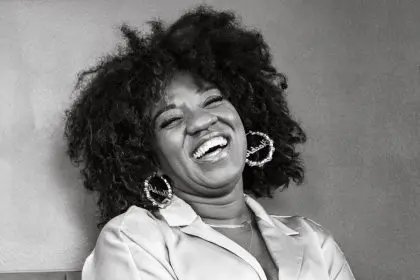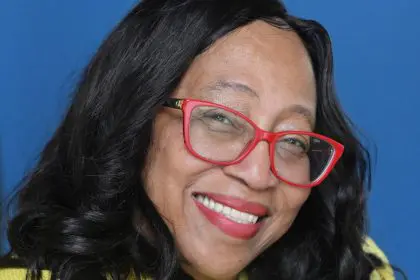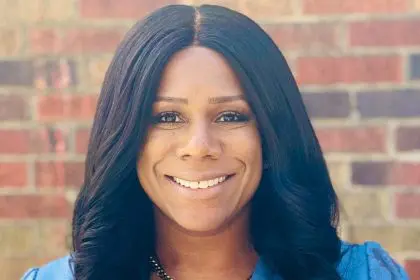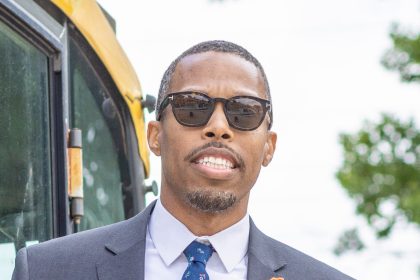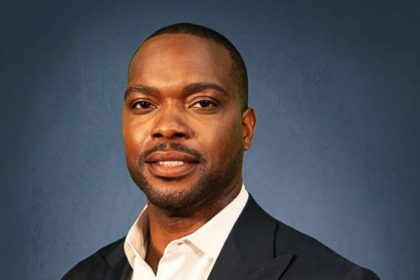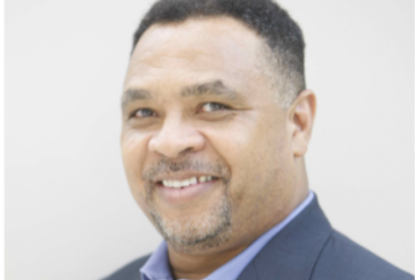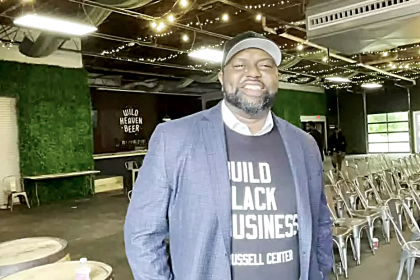Roderick A. Hardamon, a Detroit native and a Morehouse College graduate, is the CEO and Chief Strategist of URGE Imprint, an integrated boutique management consulting firm headquartered in Detroit. Urge Imprint is a consortium of diverse professionals who focus on helping clients ideate and execute. Imprint’s approach is based on intellectual instigation rooted in honesty and partnership.
Hardamon is also the CEO of URGE Development Group, a real estate development firm focused on systemic change in urban communities through creative placemaking. Hardamon leverages his more than 20 years of experience in strategy, business innovation, mergers and acquisitions, diversity and inclusion, educational consultation, fundraising, capital markets and operational transformation to support the needs of each client called into partnership with the firm.
He recently spoke with Munson Steed, publisher and CEO of rolling out, and this is their conversation:
If you ever imagined that you would be having meetings with mayors and running multimillion-dollar portfolios, where did this dream start?
I can’t tell I would have imagined that. But a dream starts simple, like most kids’ dreams. Just a crazy idea or just having fun. I remember playing Monopoly and being fascinated by the opportunity to buy and sell properties. And, until my daughter came along, I hadn’t lost a game of Monopoly in like two or three decades. But of course, my 10-, 11-year-old took care of that. I just remember going to the top of the Renaissance Center here in Detroit, looking out and playfully saying with my cousin, “We’re going to buy that block. We’re going to buy that block. I’m gonna buy that block,” and no one told us we were crazy for saying it. That’s where it all began.
When you think about Detroit, and many people have never made it to the D, you’ve seen Black CEOs before. You’ve seen titans of industry. What is it like when you are there? And, you know that there’s a Picard, you know that there’s the Throwers, you know that there has been a Don Barton, you know that there’s been a Don Coleman. What does that do for the spirit of a young brother growing up in the D?
Growing up in the D set a different paradigm and example for me — what was possible. I didn’t think you could not be — because I’m used to Black leadership, Black mayors, Black council leaders, Black CEOs. When I was young and I was a caddy, I was caddying for Black executives. It just made sense. And, so, when I went to Morehouse and I wanted to go into business, I never thought I couldn’t be successful. My only first doubt was when I went to Wall Street, and I walked into the room, and I was the only one, except for my internship class. But coming from the D, and knowing I had seen this already, I had mentors who had guided me through that process. It made a big difference. So, that foundation of knowing that we can lead, but not just knowing we can lead, but expecting we can lead, expecting we can have impact, expecting that we can be dynamic, provided a foundation that has carried me to this day.
You mentioned Wall Street. Financing is important. What did you learn as a CEO? What are some muscle business memories that you took from Wall Street that you apply today?
That’s a great question. I think a couple of big things. One, most people think the most important currency they have is their talent or intellect. But I learned first, it’s your credibility. People don’t buy products. They buy you. They buy the brand and the image. If they trust you and they believe in you, it’s easy to say yes. And when they don’t, they will never say yes. So, you gotta do what you say you’re gonna do. Be credible. Be upfront. Be direct, and be honest. So, that was the first big one.
Two, there is no shortcut to success. None of this is easy. No one who’s ever been successful has ever had it handed to them. You may have a head start, but you still gotta put the work in. This is hard work. I tell my children today, every day we get it out of the mud. Don’t get fooled by all the shiny pictures with elected officials and stuff. That’s the after-effect. The work we do every day is hard. It’s important. It’s impactful. But you gotta get grimy to make this stuff happen because nobody’s gonna give it to you.
What is it like to have philanthropic partners in Detroit like Rocket Community Fund and Gilbert Family Foundation supporting community development?
When you have partners in your ecosystem, that’s a big thing. A lot of cities talk about ecosystems, which means they got all these partners around that kind of help out. In Detroit, we have an ecosystem, a system of and collective partnership where different organizations, whether super big or small, work together to make the impact in the city happen. So, when you have anchor institutions like Rocket Community Fund in your back pocket, in your backyard, it provides a sense of momentum and propels initiatives by their very presence. And also, when they’re aligned on a mission of impact in the neighborhoods and providing affordable housing that aligns with your own personal mission, that just propels those impact measures that much faster.
In the area of real estate, thinking about being a developer, why should we take up that space?
That’s important, I think, in particular, for anyone who wants to impact a neighborhood, but especially for Black and Brown folks. We have a perception about our communities that no one else has. I always tell folks there is not a real estate or any investor that invested in anything that didn’t have value. We invest in things that people have not seen the value in yet. And so, because we understand our communities better than most, we see the value, which is why our grandmas and our aunties never leave the neighborhood because they never lost a view of the value. And so, as we move into the real estate development space, we get to articulate and reconstitute our own value in our own neighborhoods. We get to have a chance to employ our own communities. We have the chance to create economic generational wealth for our neighbors and our aunties and our uncles by raising the home values because we put investments in. We have to take that control. We have to have that power. And by controlling what is built and how it reflects our communities is how that starts.
If you were going back to Morehouse, giving a commencement speech, or even at a Howard or a FAMU, how important is being at an HBCU? How has it impacted your career as a CEO?
I wouldn’t have had my time on Wall Street. I probably wouldn’t be here without going to an HBCU. Not only did Morehouse give me the self-confidence and grooming like I got a great foundation in Detroit. When you walk into a room, there are thousands of other Black men, and everybody [is] just as smart, just as cool as you are, got just as much hustle as you have. Like, “Oh, this is a movement.” And so, it gave me the confidence that we can make a real impact. Morehouse gave us the space and agency to make the mistakes that many of us don’t get to make. You got to be your first executive by running governments, by learning organizations, by starting small businesses, getting your side hustles on.
I had a beverage stand at a flea market; but, it’s all because we were at an HBCU. We had these things we could do that gave you the support and the foundation to move and shake in a different manner. And so, once you move into the world, when I went to Wall Street, when I wasn’t surrounded by that community, I still had all that in my spirit, in my soul, and that gave me the confidence to keep moving. And also, knowing that I can compete amongst the best of the best at Morehouse. I knew I could do it when I went to Wall Street as well. So, I didn’t walk in thinking I was less than. I was like, “I’m the best analyst here. Let me show you how it’s done.”
Taking those same analyst ideas into doing presentations, building a development firm. How do you present? And, what do people need to know that people are looking for when you’re putting a big deal together, a million-dollar deal, ultimately heading toward billion-dollar deals that have long-term impact and development?
It’s about the story. Do you have an idea, a focus, and a vision for what can happen today and for the future? People want to buy that vision, that story. That’s the first thing. Then, the second thing is that, while that story is great, it’s got to be supported with hardcore technical analysis. The numbers have to make sense. So, they say, “The math’s gotta math.” And when you do that well, it provides not only a vision that people can believe in but they can see the actual economic benefit of that work, and that’s what people buy into. So, when you couple the story and the technical capabilities, now [all] you gotta do is execute. You gotta show a track record of getting it done, even when it’s hard. This is always going to be hard. You gotta push through, persevere, and get it done.
Lastly, that commencement speech — how would you challenge? Give three things that Rod Hardamon, who hasn’t graduated yet, but he’s sitting there, and he’s getting ready to meet the world. He has to be able to dream. You’re that commencement speaker with your honorary doctorate from your alma mater. What would you challenge him to do? And, what would the title of your speech be?
It would probably be “From Pawns to Players.” Helping us understand that there is nothing we can’t achieve. I remember thinking my ideas were big and bold at Morehouse. I had a thought about owning a bank, and people thought I was crazy. But now, fast forward 30 years later, I run a fund which is effectively what I wanted to do, providing capital to my community and having an impact on the things I wanted to do. And I’m doing that today. I would tell them that all those crazy dreams you have, they’re just planting seeds. I tell everybody else, plant the seeds of your own future today.
You don’t know when you’re gonna harvest them. You don’t know how the tree will sprout, but you plant a seed every day. Every positive seed you plant will impact you and the world in ways you can’t imagine. Plant as many seeds, be excellent, be audacious, dream big, because no matter how big your dream is, the world and the universe, and God will amplify that. So, go big, and it’ll just get bigger.
You’re invited to “Dream Doors Lunch & Learn.” Tap here to RSVP –

